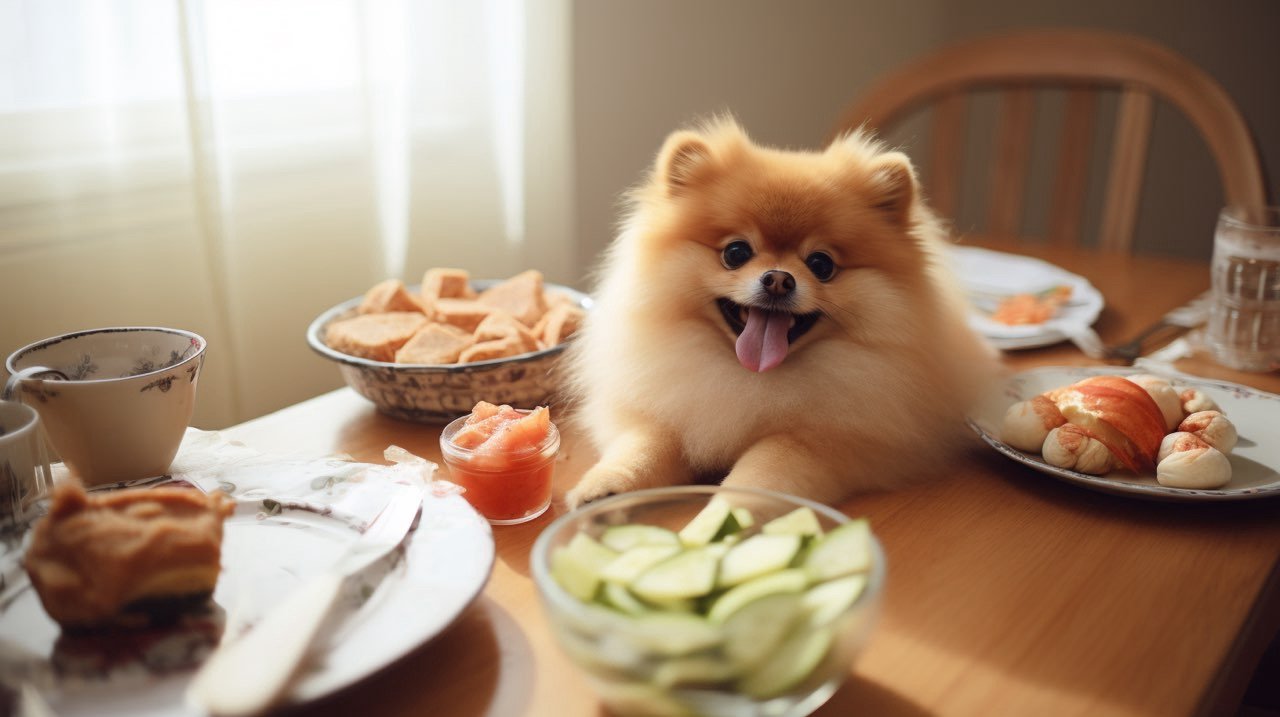
When it comes to treating your Pomeranian with human foods, safety and moderation are key. Pomeranians, like all dogs, have specific dietary needs and sensitivities, so it’s important to know which human foods are safe and beneficial for them. Here’s a carefully curated list of human foods that you can occasionally share with your Pom, ensuring each treat is safe and healthy.
1. Carrots
-
Benefits: Carrots are excellent for your Pomeranian’s teeth and are rich in vitamin A, which is good for your dog’s immune system and skin health.
-
How to Serve: Offer them raw for a crunchy treat that helps clean teeth, or steam them for easier digestion.
2. Apples
-
Benefits: Apples provide a good source of vitamins A and C, as well as fiber, aiding in your dog’s digestion.
-
How to Serve: Remove the seeds and core before slicing them into manageable pieces to avoid choking hazards.
3. Chicken
-
Benefits: Cooked chicken is a great source of protein that most dogs find delicious.
-
How to Serve: Ensure the chicken is cooked plainly, without any garlic, onions, or seasoning. It can be shredded in small amounts and added to their regular dog food.
4. Pumpkin
-
Benefits: Plain pumpkin is a fantastic source of fiber and beta-carotene.
-
How to Serve: Use plain, canned pumpkin or cook and mash pumpkin at home. Make sure it’s unsweetened and free from spices.
5. Green Beans
-
Benefits: These are low in calories and high in fiber, making them a healthy snack that can help maintain a healthy weight.
-
How to Serve: Cook them without any oils or seasonings, either steamed or boiled.
6. Salmon
-
Benefits: Salmon is rich in omega-3 fatty acids which can help keep your Pom’s coat shiny and support their immune system.
-
How to Serve: Fully cooked, deboned, and served plain.
7. Rice
-
Benefits: Plain boiled rice can be a good option for Pomeranians with upset stomachs, providing a source of energy and fiber.
-
How to Serve: White or brown rice cooked plainly without any butter or seasoning.
8. Peanut Butter
-
Benefits: It’s a good source of protein and healthy fats. Make sure it’s unsweetened and doesn’t contain xylitol, which is toxic to dogs.
-
How to Serve: Use it as a treat or stuff it in toys to keep them entertained.
9. Blueberries
-
Benefits: Blueberries are antioxidant-rich, which helps protect your dog’s body from free radicals. They’re also a good source of fiber and vitamin C.
-
How to Serve: Fresh or frozen, blueberries make a refreshing, low-calorie treat. Ensure they are washed and served in small quantities.
10. Cottage Cheese
-
Benefits: This is a high-protein, low-fat snack that’s good for your dog’s muscle maintenance and overall health.
-
How to Serve: Choose plain, low-fat cottage cheese in small amounts, particularly if your Pom is not used to dairy products, as some dogs can be lactose intolerant.
11. Sweet Potatoes
-
Benefits: Sweet potatoes are a great source of dietary fiber, vitamin B6, vitamin C, and beta-carotene.
-
How to Serve: Cooked and mashed or cut into small, chewy pieces after baking, with no added seasonings or sugars.
12. Bananas
-
Benefits: Bananas are a good source of potassium, manganese, vitamin B6, vitamin C, fiber, biotin, and copper.
-
How to Serve: Offer them in small amounts as they are high in sugar. Bananas can be sliced into rounds or mashed as a topping for their regular food.
13. Eggs
-
Benefits: Eggs are a complete source of amino acids and are high in protein. They also provide selenium and biotin.
-
How to Serve: Cook them fully, either boiled or scrambled, without any butter or oil.
14. Broccoli
-
Benefits: This vegetable is high in fiber and vitamin C but low in fat. It is beneficial in small quantities.
-
How to Serve: Steam the broccoli until soft but still crunchy, and ensure it’s cut into tiny florets to prevent choking.
15. Watermelon
-
Benefits: It’s hydrating and full of vitamins A, C, and B6.
-
How to Serve: Remove all seeds and the rind to prevent intestinal blockage. Serve it in small chunks, especially during warmer months for a hydrating treat.
Moderation is Key
When introducing these foods, always keep portions small and integrate them into a well-rounded diet. Your Pomeranian’s main source of nutrition should still be a high-quality dog food that’s specially formulated for their dietary needs. Treats, including safe human foods, should not make up more than 10% of your pet’s daily caloric intake.
Consultation with a Vet
Before making any diet changes, it’s a good idea to discuss with your veterinarian. They can provide personalized advice based on your Pomeranian’s health, dietary needs, and potential food sensitivities.
By diversifying your Pomeranian’s diet with these safe and healthy human food options, you not only add excitement to their mealtime but also contribute to their overall well-being. Just remember to introduce new foods slowly and watch for any signs of digestive distress or allergies.
Precautions to Consider
Always introduce any new food into your Pomeranian’s diet gradually to monitor for adverse reactions, such as allergies or digestive upset. Keep portions small—their primary nutrition should always come from high-quality dog food formulated to meet their specific health needs.
Remember, not all human foods are safe for pets. Foods like chocolate, caffeine, grapes, raisins, onions, and garlic should be avoided as they can be toxic to dogs. Always consult with your vet before introducing new foods into your Pomeranian’s diet.
